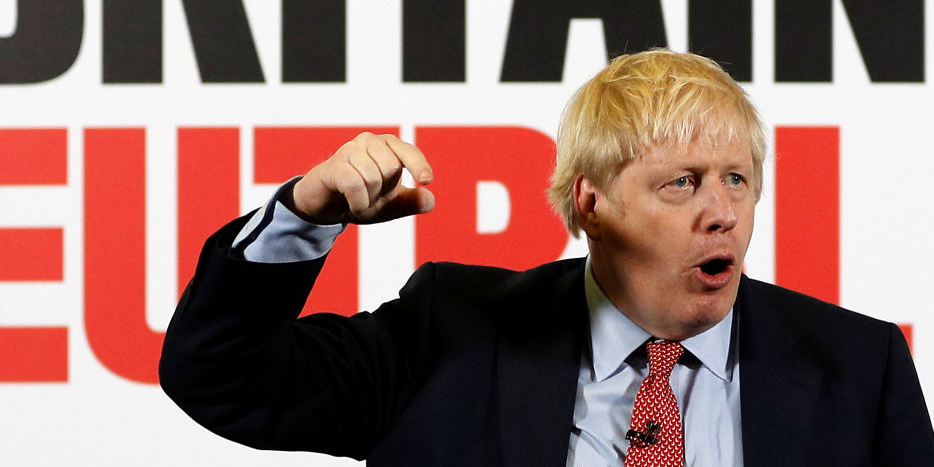- The UK will hold a general election on December 12.
- In his final Sunday news appearance before the vote, Prime Minister Boris Johnson admitted he was nervous but repeatedly refused to say if he would step down if the Conservative Party fails to win a parliamentary majority.
- Numerous polls have put the Tories on course to win a majority, but there are growing influential voices telling voters not to vote for Johnson.
- On Sunday Johnson also vowed to reduce immigration, reiterated claims that a leaked government document was wrong, and admitted to inflating figures on a Conservative manifesto pledge to hire more NHS nurses.
- Visit Business Insider’s homepage for more stories.
UK Prime Minister Boris Johnson has refused to say whether he would quit if his Conservative Party fails to secure a majority in the country’s upcoming general election.
Though numerous polls have put Johnson on course to win a majority in the December 12 election, Johnson told Sky News’ “Ridge on Sunday” he was “nervous” about the vote and that he is “fighting for every vote.” On Friday, former Conservative Prime Minister John Major urged voters to reject Johnson.
Johnson demurred each time Sophy Ridge, the programme’s host, asked if he would resign as prime minister if his party failed to secure a parliamentary majority. Ridge put the question to him three times, the Evening Standard noted.
“If you don’t mind, Sophy, what I’m going to do is concentrate on the five days before us because that is what I think the people of this country would expect,” Johnson said.
"We have got a very short time to get our message across, it's a message of hope and optimism about this country."
During the Sunday interview Johnson also pledged to reduce immigration, reiterated claims that a leaked government document on the post-Brexit economic impact was "wrong," and admitted to giving inflated figures on a Conservative pledge to hire more nurses for the National Health Service (NHS).
Here's a rundown of what happened:
- Johnson admitted that only 31,000 of the "50,000 more nurses" that the Conservative manifesto pledged to provide to the NHS would be new recruits. The 19,000 other nurses refer to existing nurses whom he said would not leave the service.
- He reiterated his claim that a Treasury document leaked by Labour leader Jeremy Corbyn, which confirmed there will be checks on goods traveling between Northern Ireland and the rest of the UK after Brexit, was "wrong."
"31,000 is the answer to that."
The Conservatives are promising 50,000 more nurses for the NHS.
But Prime Minister @BorisJohnson admits that only 31,000 will actually be new - the rest are already working for the health service. #Ridge #GE2019
Live: https://t.co/26sueac4Fr pic.twitter.com/oTRIi9y98I— Politics Hub with Sophy Ridge (@SkyPoliticsHub) December 8, 2019
- Johnson promised to reduce immigration into the UK by introducing an economy-focused Australian-style system, which evaluates whether migrants enter the country by allotting them points for their education, language proficiency, and work experience.
- "You've got to have a system by which politicians can say to people: 'Well yes, we are letting people in but we're doing it in a way that is controlled and checked,'" Johnson told Ridge. But experts say such a system would actually increase immigration levels.
- He struggled to say what the "naughtiest" thing he had done was, and consulted his advisers before finally saying: "I may, sometimes, have not always obeyed the law by cycling on the pavement."
"What is the naughtiest thing I’ve ever done?"
The PM struggles to answer, but cycling on the pavement is the naughtiest thing @BorisJohnson is willing to admit to @SophyRidgeSky. 🚴#Ridge #GE2019
Get #GeneralElection2019 updates here: https://t.co/26sueac4Fr pic.twitter.com/DOcofJVHrO— Politics Hub with Sophy Ridge (@SkyPoliticsHub) December 8, 2019

